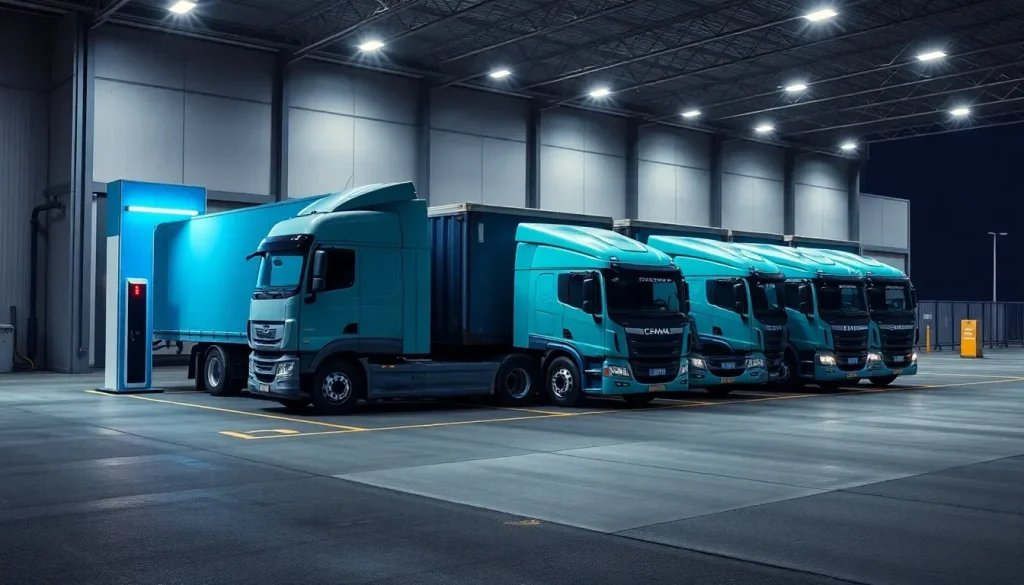Prologis and Maersk Depot to Charge 96 Heavy-Duty Electric Trucks

The shift towards sustainable transportation is gaining momentum, especially in the heavy-duty trucking sector. Companies are increasingly recognizing the need to invest in infrastructure that supports electric vehicles (EVs) as part of their efforts to decarbonize logistics. One significant development in this landscape is the new EV charging depot established by Prologis and Maersk, which stands as a testament to the future of zero-emission trucking.
This innovative facility not only enhances the charging capabilities for electric trucks but also plays a crucial role in meeting stringent environmental regulations. As we delve into the specifics of this project, it becomes clear how such initiatives are paving the way for a greener transportation sector.
Overview of the Prologis and Maersk EV Charging Depot
Prologis, a global leader in logistics real estate, and Performance Team – A Maersk Company have jointly launched a state-of-the-art EV charging depot in Southern California, which is now the largest of its kind for heavy-duty trucks. Situated conveniently near the Ports of Los Angeles and Long Beach, this facility is strategically positioned to serve the growing demand for electric trucking solutions.
The depot is powered by the largest electric truck microgrid in the U.S., allowing it to charge up to 96 electric trucks simultaneously. This capability is vital as the logistics industry transitions towards more sustainable practices, aligning with the broader goal of reducing carbon emissions.
Strategic Location and Infrastructure
The new depot is located just off the Harbor (110) Freeway on Denker Avenue, making it easily accessible for logistics firms operating in the region. Its proximity to major highways, including Interstate 405 and California State Route 91, facilitates efficient operations and enhances connectivity for freight movements.
- Location Benefits: Close to key transportation routes.
- Accessibility: Designed for easy ingress and egress for heavy-duty vehicles.
- Infrastructure: Equipped with advanced technology to support rapid charging.
This strategic positioning allows Performance Team to leverage its fleet of Volvo VNR Electric trucks, which boast a range of 240 miles and can recharge to 80% in just 90 minutes. Such efficiency is crucial for maintaining operations within the demanding logistics sector.
A Commitment to Decarbonization
Maersk's Regional President for North America, Charles van der Steene, emphasized the company's commitment to transitioning towards decarbonized supply chains. He stated, "Expanding the charging infrastructure for commercial electric vehicles is a key part of that." This initiative is a significant step towards achieving Maersk's ambitious goal of net-zero emissions by 2040.
Furthermore, the collaboration between Prologis and Maersk is a clear indication of the industry's collective commitment to sustainable practices. Henrik Holland, Global Head of Prologis Mobility, highlighted the importance of innovation in this transition, stating, "To bring the depot online quickly, we delivered an innovative on-demand charging solution as an interim power connection measure."
The Role of Infrastructure in the Electric Truck Transition
As California moves towards stringent regulations that require the phasing out of diesel trucks by 2035, the need for robust electric vehicle infrastructure becomes increasingly pressing. The new depot not only addresses this need but also prepares logistics companies for upcoming compliance requirements.
- Regulatory Landscape: California aims to end diesel truck sales by 2035.
- Transition Timeline: Electric heavy-duty trucks must be operational by 2045.
- Infrastructure Development: Projects like this depot are critical for meeting compliance.
By establishing this charging depot, Prologis and Maersk are not only enhancing their operational capabilities but also setting a precedent for the rest of the industry to follow. This proactive approach is essential for meeting environmental goals while ensuring the logistics sector remains competitive.
Technological Innovations in Charging Solutions
Prologis has implemented cutting-edge technology to expedite the deployment of charging infrastructure. The facility uses a microgrid designed in collaboration with Mainspring Energy. This microgrid integrates various energy sources and can operate independently of the local grid, providing greater reliability and efficiency.
The Prologis Denker microgrid features:
- Fuel-Flexible Generators: 2.75 MW of hydrogen-ready linear generators.
- Energy Storage: 18 MWh of battery capacity.
- Charging Capacity: Up to 9 MW available for truck charging.
This innovative energy solution not only supports the immediate needs of the depot but also aligns with future energy trends, positioning the facility as a leader in sustainable logistics infrastructure.
Conclusion: The Future of Electric Trucking
The launch of the Prologis and Maersk EV charging depot marks a significant milestone in the transition towards sustainable logistics. As the industry faces increasing pressure to reduce emissions and comply with stringent regulations, initiatives like this will play a critical role in shaping the future of trucking.
By investing in robust infrastructure and embracing innovative technologies, these companies are not only improving their operational capabilities but also leading the charge towards a cleaner, greener future for the logistics sector.
For more insights on electric trucks and sustainable transportation initiatives, check out this informative video on Maersk’s order of electric trucks:




Leave a Reply